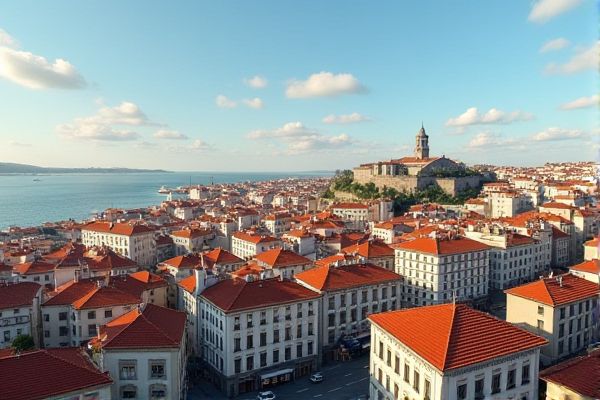
Transportation and commuting in Portugal: Reliable public transport systems. Affordable metro services. Extensive train network. Efficient bus services. Tram services in Lisbon. Bike-sharing schemes available. Roads are well-maintained. Car rental options widespread. Toll roads common on highways. Ridesharing apps widely used.
Reliable public transport systems.
Portugal boasts a dense, efficient, and user-friendly public transport network, including various modes such as trains, buses, trams, funiculars, and metro systems particularly in Lisbon and Porto. These systems are renowned for being clean, safe, and reliable, ensuring seamless connections between major cities and international destinations. For more detailed information about the transportation network, you can visit the Expatica website.
Affordable metro services.
In Portugal, both Lisbon and Porto offer affordable metro services. In Lisbon, a single metro ticket costs EUR1.50, and a daily ticket is EUR6.40, while in Porto, a single ticket is EUR1.20, with daily tickets available for EUR5.20, depending on the zones traveled. For a comprehensive guide on how to navigate these cities using public transport, visit the website Transportation in Portugal to learn more about the different options available for exploring these fascinating cities.
Extensive train network.
Portugal's extensive train network, managed by Comboios de Portugal (CP), connects major cities like Lisbon, Porto, Aveiro, Coimbra, Faro, and Lagos, offering various services including the high-speed Alfa Pendular, Intercidades, Regionais, and Urbanos trains.
Efficient bus services.
Portugal's bus services are highly efficient, offering an array of options such as Alta Qualidade (deluxe, high-speed), Expressos (comfortable, fast), Rapidas (quick regional connections), and Carreiras (slower regional services). Operated by companies like Rede Expressos, Rodo-Norte, and Eva Transportes, these services provide modern amenities like air-conditioning, Wi-Fi, and sometimes food and drink services. For those considering relocating or traveling in the region, Expatica serves as an invaluable resource for detailed guidance on navigating public transportation in Portugal. These amenities and the range of service types make buses a reliable and comfortable way to travel across the country.
Tram services in Lisbon.
The Lisbon Tramway Network, in operation since 1873, comprises six lines covering 31 km, with 63 trams including historic "Remodelados" and modern articulated trams. The trams connect key areas of the city, including tourist attractions and residential districts, and are an essential part of Lisbon's public transport system. Discover more about this historic transit system by exploring the Lisbon Tramway Network and its role in the city's daily life.
Bike-sharing schemes available.
In Portugal, particularly in Lisbon, the Gira bike-sharing scheme offers bikes and e-bikes to residents and tourists. The service includes docking stations around the city, with bikes free for the first 45 minutes and EUR2 for each subsequent 45 minutes. Users can unlock bikes using a mobile app. For more information on the service features and benefits, visit the Gira Bike-Sharing Scheme official page.
Roads are well-maintained.
Portugal's roads are generally well-maintained, boasting a quality rating of 6.00 points in 2019, which is above the world average. However, there are exceptions, particularly with some secondary roads, such as those in the Algarve, which can be poorly maintained and pose safety concerns. For more detailed information on this topic, you can explore the road quality at The Global Economy, a comprehensive resource that provides insights into infrastructure across countries. Understanding these variations in road quality is crucial for anyone planning to travel or invest in Portugal's transportation infrastructure.
Car rental options widespread.
Car rental options in Portugal are widespread, with companies like Europcar offering a wide selection of cars, convenient airport and city locations, competitive pricing, and 24/7 customer support. Major cities like Lisbon and Porto have numerous rental locations, and renting a car is particularly recommended for exploring rural areas and the Algarve region. For those planning a trip, check out the Europcar website for more detailed information and booking options to ensure a seamless travel experience throughout Portugal.
Toll roads common on highways.
In Portugal, toll roads are common on highways, featuring two main types: conventional tolls and electronic tolls. Conventional tolls have booths where payment can be made in cash, by bank card, or via the Via Verde system. Electronic tolls, on the other hand, utilize sensors and require devices such as Easytoll, Tollcard, or Via Verde for payment, ensuring a seamless journey. For more detailed information, you can visit the Visit Portugal website, which provides comprehensive guidance on using these toll systems effectively.
Ridesharing apps widely used.
In Portugal, the widely used ridesharing apps include Uber, Bolt, Freenow, Taxilink, and IzzyMove. These apps offer various services such as diverse vehicle options, scooter rentals, and comprehensive mobility solutions, with Uber and Bolt being the most recognized and widely available across multiple cities including Lisbon, Porto, and other major urban centers. If you're looking for an in-depth guide on navigating the local streets, check out Navigating Portugal Streets With The Top Taxi App.
